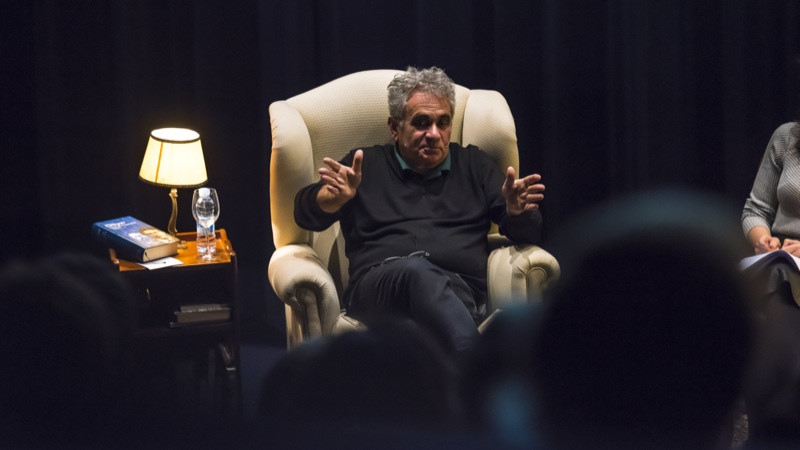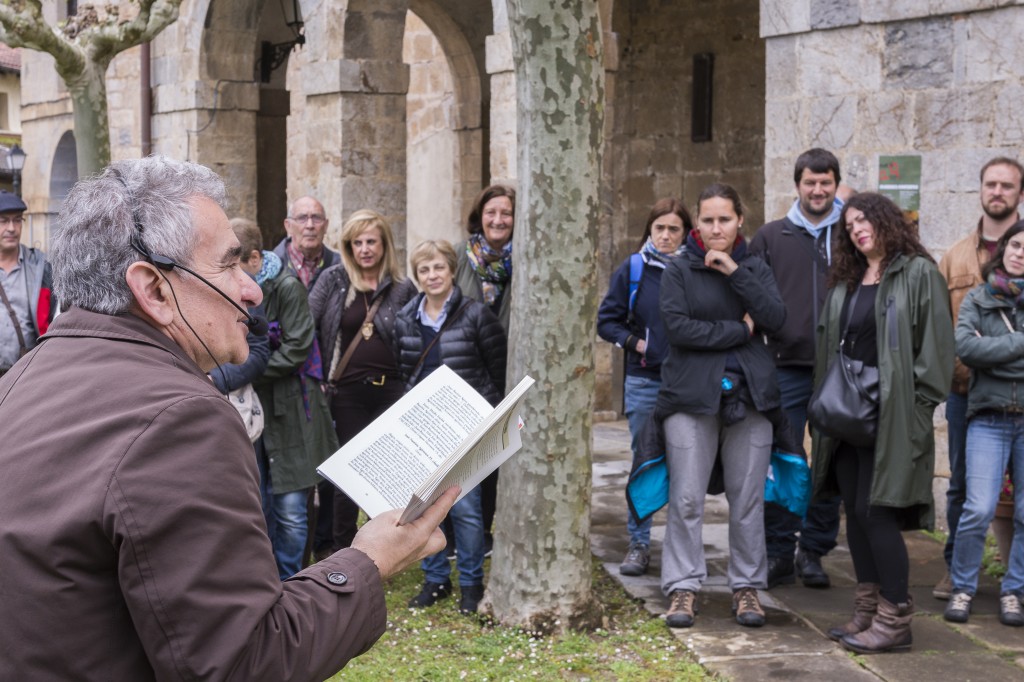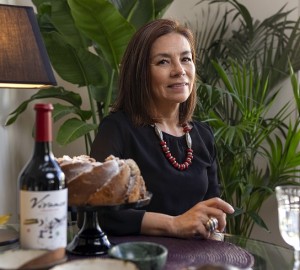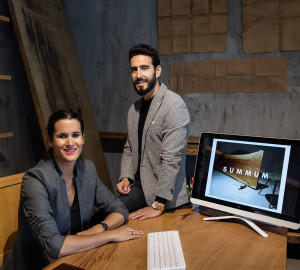Bernardo Atxaga, in sips
By Lali Ortega Cerón
On 22 July, at Ways of Telling about Wine Culture
"Now I understand that the complexity of life is really the mystery. Reading and writing has been the way for me to access the world".
He has only just come from the greengrocer's. Perhaps he hasn't even had time to put some pods, apricots and melon in place. Perhaps he hasn't even had time to put some pods, apricots and a melon in place. A frugality that transcends gastronomy, because the writer Bernardo Atxaga does not need much to achieve a state close to happiness: "I have learned to be content with the little things. I leave the big things to epic writers. In my case, happiness is quite similar to tranquillity. If I'm quiet, sitting in a chair, I don't know if I need much more".
Surrounded by mountains, in a small village in the province of Álava, the calmness that we also find when reading his books (despite the occasional story in which there is a deep sense of loneliness and unease) creeps into the conversation. Those who have the pleasure of interviewing him highlight his eloquence in writing and his kindness. I can vouch for this. And also his agility in weaving together thoughts and similes, which his family, friends and readers unravel so well. A gift he nurtured from the age of 15 and which, fortunately, was put down on paper in 1972, at the age of 21.
Since then, a book by Bernardo Atxaga has been synonymous with enjoyment, with sentences that mark the reading and remain suspended, like a satellite, to catch them. To unravel them. "If the work remains on the table, if that writing is not socialised, without that response, sometimes favourable, sometimes negative, it is very difficult to continue in the craft of writing". Fortunately, his work has not faded away amidst unfinished good intentions. His book of poetry, Ethiopia, was crucial. Even the students had it on their bedside tables. And that's where it all began...
What a great afternoon I'm having reading your first great success Obabakoak (National Narrative Prize 1989). As the humorist says, if this keeps up, you've got a reader for life!
(Much laughter) All right, all right.
As a writer, always with your eyes wide open?
Of all the senses, the most culturally and historically important has been sight, so that we associate it directly with intelligence. "I see you" means "I understand you". And when we say "I didn't see you", it is almost always a lie. It has the particularity that it is very applied, unforgiving, and intense in terms of perception. For a writer it has its pros and cons: I'm not in favour of having a lot of descriptions in a book based on the eyes, because possible faults are more easily detected than with the ear. And with sight there are tropisms, like the romantic full moon.
Photo: Donostia/San Sebastian 2016
Like memory, which can be misleading?
Well, rather than being misleading or treacherous, it is that we cannot see the infinite because we are intellectually limited. Memory does not fit in a list, it is of such variety, diversity and detail! Sometimes it appears in dreams or unconsciously. Perhaps it is a fortunate limitation because otherwise we would go crazy.
What do you look for when you meet someone?
In reality you have already noticed it before you become conscious. Immediately there is a perception, unpleasant or extremely pleasant. In that sense Arab culture is right: the look is fundamental, it expresses a whole history and is very important to know what someone is like. So is the voice, not so much for whether it is pretty or ugly, but for the history it carries, including the family history. Voices between generations are similar.
Speaking of the look, I was thinking when I saw your interviews and your way of expressing yourself, also with your eyes, what other profession could accompany you. (He remains thoughtful...). I think Bernardo Atxaga could be an astronomer.
There's a book I've just edited called Overtime. And that's exactly what I'm talking about. Of poetic, almost physical impressions. And I cite the falling snow, the vision of the starry night... And even more so when I was born in a village, at a time when there wasn't so much luminosity. For me it has been a poetic source and I have always collected theories about the stars. Well, well...! I wouldn't mind being an astronomer!
Why do you write?
For as long as I can remember I have associated, as I would say... the two sides of the page, writing and reading. By that I mean the understanding of the world, the intelligent way of being in it, the profound way of being in life. An attempt, always, to come closer to understanding that short, but extraordinarily complex word. Now I understand that this complexity of life is really the mystery, what in Alice in Wonderland means to be on the other side of the mirror. Reading and writing has been my way of accessing that world. I started doing it at a very young age, at school. My family moved to Andoáin, an industrial town that was lucky enough to have a library that I used to go to all the time. Look at what I'm going to tell you: I think you keep writing because it's difficult to keep going. The result doesn't coincide with the expectations you had when you started. It must be very similar to what they say about poker: if they didn't lose, they wouldn't keep playing. Wanting to do better pulls on you, it pulls on the writer.
With all your physical and imaginary travels around the world, what is the greatest motivation to keep on living?
Love. A word that is in danger of being destroyed because it is misused or trivialised. When it comes to understanding the world, and words, we must go beyond the cliché, the banal and self-interested use of the term. Those who live in hatred or indifference are fast becoming molluscs. They are sad people.
The accordion player's son... do you have the remedy to tame our ghosts or learn to live with them?
The first and most important thing is not to make it easy for them. (laughs). The people inside us, who often don't live in our conscience, need a certain environment, help, in order to emerge. I have a song that says that the heart is a fragile piggy bank. The night is propitious. And lonely places. It is preferable not to return to places where one has suffered... All that helps.
What are your feelings about writing a book...? There is a lot of intimate and personal
A lot of satisfaction. I don't know what to call it... I wouldn't know, I couldn't live without writing. It has its difficulty and its phases. The first one, when you think you have a good idea, and you make notes, there is a certain euphoria. Then, when you write, the obstacles arrive. Later you think that the current that is a text reaches the end, it's finished, and then you ask how it is, because throughout the process you lose perspective... And finally, there is a certain anxiety about how it will be received. There is always a tension when the book is already "socialised".
What have you discovered about yourself?
While you're writing your head goes very fast. It's funny, but lately I've been bringing out the humour, which brings me closer to another way of being that I've seen in myself, and which before was a facet that I only projected in stories and children's books. And in songs. And maybe I'm also discovering darker aspects, but you don't talk about those in an interview! (laughs)
In a library, apart from damp and dust mites, what is your worst human enemy?
Probably... I'm going to say something that might surprise you: that it falls into the hands of a person who likes to read a lot and doesn't like to read a lot. There are people who collect books in order to have thousands of volumes. It's not about having an infinite library, but an essential library: "my essential books".
If you are reading Atxaga for the first time, which book would you recommend?
Well, how difficult. There are two Atxagas. I would perhaps start with the last books because there are probably fewer marks in time. One would be Siete casas en Francia (Seven Houses in France), with a more black humour. And a more poetic book in prose: Días de Nevada, very personal. It depends on the reader's mood. Also the one that has just come out: the reissue of Overtime.
After your experience in Nevada, which has inspired you so much to write... you return to Spain. In some statements you said that you don't get depressed in a bar.
Before going to Nevada I lived in Atlanta, for example. It was the first experience and maybe the hardest, because suddenly there is no street and you can't go out for a walk. Meeting someone is not so easy either, because they live in the condominiums, in the university, and they have no relationship with the outside world. When I came back to Vitoria and saw a street with five cafés (maybe I'm used to it), I thought I was living here better than anywhere else.
Talking for the sake of talking, touching on trivial topics, is it healthy?
Conversation is perhaps the greatest entertainment we can have, and how good it was when in the train compartment you were with someone who talked a lot, and talked well, and told things! It was entertaining and fun. Nowadays we are forgetting to talk, because talking is very often based on oral tradition and reading. We speak by repeating facts that we have read and heard. In today's society, always with their phones... on recent train journeys I have noticed a certain increase in the level of boredom, that people speak little and badly. Lately, when I travel by train, I prefer to contemplate the landscape.
Photo: Mikel López González
Experience is a degree and it shows even in the way you write: over the years, have you found answers to the enigmas of life and death?
They are much better understood. You asked me before about writing... it's something maieutic, of knowledge towards others and of self-knowledge. Life at first seems like a straight line, you don't see the end; then it seems like a curve and you see it better. In any case, I don't think there is an identical approach to the big issues, which is the same between two people. There are variations, because circumstances are very influential: culture, family situation, social... Very close to me, a person has died and another friend, my age, has lung cancer... it sounds like a joke, but she told me that it was one of the happiest times of her life because she had never received so much love. She has no physical pain and she is living it as another moment in her life, without much emphasis on talking about the moment. In the case above, that friend made her funeral a work of art, he left written instructions for the ceremony. Now, with the years, I have some clear issues: out of the hundred I have in front of me, when I was young I could have 5 defined elements; and, now, about 50 or 60. There is a progress in understanding. From there to 100%? When the accountants (I am an economist) finished the exercise by hand, they put two dashes. You can decide where to place them: this is as far as I've got and I'm not going to think any more, I'm not going to worry any more. To want to understand everything would be arrogance on my part.
From economist to writer... any thoughts for those who don't feel good in their own skin (due to various circumstances) and want a change?
It's about wanting to do it, having the will. You have to take it literally. Anything else is rhetoric. When you really want to do something, you leave whatever it takes and find the time. For example, when I was studying economics and there was a strike I thought, great, now I have two weeks in which I can write, or try to write! I worked in a bank for a year, and then as a teacher, and then I quit. I've been writing for 29 years now. Sometimes one wonders if perseverance, willpower, are inherited virtues that are carried in the blood or are learned. I see that my faults and virtues were inherited from people in my family.
Reading and children. How to get them to read.
I have a theory that may not be feasible. We are talking in general, not about a specific child in a specific family. The best thing is to go back to theatre. Along with poetry and song, it is one of the first modes of communication. I have a lot of faith in it, it's wonderful and it always works very well. It only has one problem: it seems to be expensive. And governments spend money on football, or whatever they spend money on, and politics today is not run by people with cultural sensitivity. If they don't read or go to the theatre... Nowadays actors almost have to do monologues, not because they like it, but out of necessity, because the productions are expensive.
Your wine memories
I have them, of course. I associate wine with ceremony. I am not a chiquitero, but I like to drink wine at ceremonies: if I have finished a book, if the magazine is in print... My mother liked it a lot, she always ate with wine, and in restaurants she would ask for it. My father, however, was a cider drinker. In my house there were always two bottles, cider and wine, mother and father. That's how it is. My evolution is a synthesis of the two.
I find many reasons for the public to sharea conversation and a glass of wine with you on Saturday 22 July at Vivanco Ways of Telling about Wine Culture. What is yours?
Interlocution is very important, the invitation to speak (for example, I never accept a symposium of 1232 writers, an industrial meeting, a meeting of the masses). I know that for a long time at Vivanco there has been a strong connection with culture, with art, with painting. The interlocution is not a phone call, but an invitation to talk. It seems to me to be a culturally significant place on the cultural map: even the greengrocer told me about the collection of paintings at Vivanco!
What are we toasting to?
To the ordinary, everyday life. The great life is every day. It is being happy with what you have.
Header photo:Garoa


















